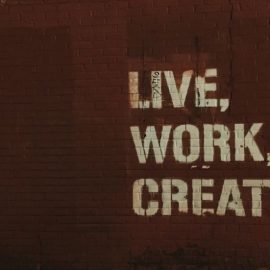

This article is an excerpt from the Shortform book guide to "The Squiggly Career" by Helen Tupper and Sarah Ellis. Shortform has the world's best summaries and analyses of books you should be reading.
Like this article? Sign up for a free trial here.
Where is your career heading? How can you plan for a fulfilling career that aligns with your interests and values?
Career foresight is a crucial ability for navigating today’s nonlinear work landscape. It involves strategically envisioning your desired future and possible career paths. This skill helps you develop truly fulfilling goals based on genuine interests rather than objective metrics of success.
Continue reading to explore how you can cultivate career foresight and chart a course toward a more satisfying professional life.
Career Foresight
In The Squiggly Career, Helen Tupper and Sarah Ellis contend that a necessary ability for succeeding in a nonlinear career is foresight—the ability to strategically envision your desired future and possible career paths so you can develop truly fulfilling goals in the present. These goals will be based on genuine interests rather than objective metrics of success (like a promotion) and will be enjoyable and fulfilling to work toward.
Having career foresight is crucial for three main reasons. First, it allows you to plan a fulfilling career trajectory autonomously. Second, when you work toward an interest-based goal and enjoy the process, you’ll discover additional interests and meaningful opportunities along the journey. Third, when you’re focused on pursuing your genuine interests, you ensure that your decisions guide you toward a career you truly want—many people switch to equally unsatisfying jobs just to escape their current one.
We’ll discuss how to practice career foresight by identifying possible career paths and developing the skills necessary to pursue them.
(Shortform note: In The Magic of Thinking Big, David J. Schwartz reiterates the importance and benefits of envisioning meaningful, passion-driven future goals and career paths, adding that there are five excuses people make that prevent them from doing so. First is self-deprecation—thinking you’re not good or smart enough to achieve your goal. Second is the desire for security, which prevents you from branching out into new territory. Third is the belief that competition is too stiff to succeed. Fourth is letting your parents set your goal rather than creating it yourself. Fifth is allowing family obligations or expectations to prevent you from pursuing your dreams.)
How to Develop Foresight in Your Career
According to the authors, the first part of developing career foresight is identifying the possible directions your career could go in. There are four directions you should consider: 1) the logical next step based on your current job, 2) a job you’ve thought about pursuing but made excuses not to, 3) the job you’d do in your dream world, and 4) a job that’s parallel to your current job—it’s a different industry or career path but uses your skills and strengths.
(Shortform note: In the previous commentary, we discussed five excuses from The Magic of Thinking Big that Schwartz says prevent us from developing foresight. If you find yourself using these excuses, Schwartz recommends altering your underlying attitude from scarcity (what you don’t have) to abundance (what you do have). You should overcome excuses and focus on your values in four main areas: health, intelligence, age, and luck.)
Further, the authors write, the most valuable possible career directions are those that promote the five abilities of nonlinear careers. To ensure the possible career direction will benefit you long term, consider the following: 1) How often will it have you practicing and developing your unique talents? 2) In what ways will it allow you to live your values? 3) How will it help build your self-confidence? 4) How will it help you use and give back to your network? 5) What future opportunities might it open up for you?
| Classifying the Ideal Career In What Color Is Your Parachute?, Richard Nelson Bolles says the ideal career must align with five facets, some of which align with the skills the authors discuss. Combining the authors’ and Bolles’s requirements will ensure you choose a career that’s most valuable to you. The first two facets of a valuable career, according to Bolles, are alignment with the people and workplace conditions—what kind of person are you, what kind of people do you get along with, and which environmental conditions make or break a company for you? These are the types of people and factors you’ll want to be present in your career. While the authors recommend considering these factors when developing your core values, they also say you can only have five core values. Even if these factors don’t make it into your core values, Bolles says they’re still important when selecting your career. Two more facets Bolles says make a career valuable are the skills and knowledge it requires you to use. You want to use the skills you’re best at and the knowledge you have that excites you. You’ll also want to ensure your career helps you further develop your skills and knowledge. Ensuring this will also arguably help you develop your self-confidence and your ability to benefit your contacts by sharing your expertise. While the authors say your career should rely on your unique talents (skills), they don’t discuss the importance of knowledge that excites you. Bolles says you should also choose a career that aligns with your life purpose. This means that the career should not only align with your values, as the authors discuss, but it should also help you achieve your underlying mission in life. Bolles recommends ensuring a career aligns with one additional factor that the authors don’t discuss—money. While the authors prioritize all the other factors above money, Bolles reminds us that money is still important to fund the things we want to be able to do in life. |

———End of Preview———
Like what you just read? Read the rest of the world's best book summary and analysis of Helen Tupper and Sarah Ellis's "The Squiggly Career" at Shortform.
Here's what you'll find in our full The Squiggly Career summary:
- How the nature of work and career paths has changed dramatically since the early 2000s
- The five abilities workers need to succeed in today’s environment
- Why climbing the corporate ladder might not be for you






